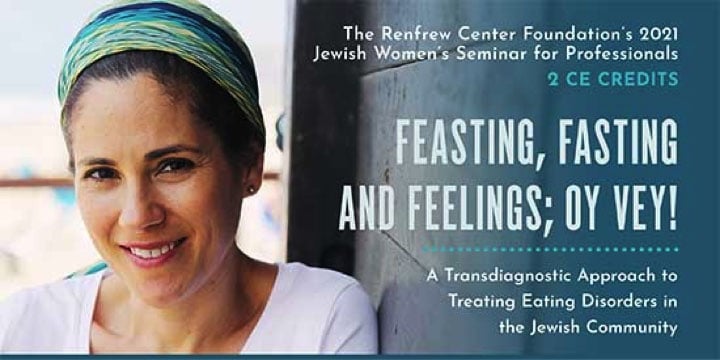 Graphic by Ponomariova_Maria/Getty Images
Graphic by Ponomariova_Maria/Getty Images To say Jewish culture focuses a lot on food would be an understatement. There are large, festive meals every Shabbat and holiday. specifically Jewish foods like cholent, latkes, and kugel and minor and major fasts throughout the year. With all this emphasis on food — or a lack thereof — some people who have eating disorders may struggle to observe Jewish laws and customs.
That’s the focus of “Feasting, Fasting and Feelings; Oy Vey! A Transdiagnostic Approach to Treating Eating Disorders in the Jewish Community,” an online seminar the Renfrew Center of New York City is hosting on May 4 from 8:45 a.m. to 11 a.m. EST. The Renfrew Center, an eating disorder treatment center for adolescent girls and women, has sites all across the United States, including in Los Angeles on Wilshire Boulevard. 
In the seminar, Jillian Hartman, LMHC and site director at the center, and Sarah Bateman, LCSW and center liaison to the Jewish community, will be presenting their teachings to viewers.
“I try to provide culturally sensitive treatment and make sure anyone who is working with people who are Jewish and have eating disorders are aware of the triggers and challenges because of the rituals and observances,” said Bateman. “I’m very careful about emphasizing that it’s not about blaming rituals or that Judaism causes eating disorders, but if people are struggling, you need to be aware of the unique challenges they have.”
One of the big challenges that Bateman works on with her patients is observing Shabbat, where Jews have two big feasts at Friday night dinner and Saturday lunch and may not be able to distract themselves with technology or other things they use during the week. “They have to sit with their feelings,” she said. “We do a lot of emotional tolerance work to try to get people to tolerate their feelings.”
She also said that fasting can bring up a slew of issues for Jews with eating disorders. “It can be triggering to observe a fast day. Depending on someone’s history of eating disorders, a rabbi might tell them they are not allowed to fast.”
It can be triggering to observe a fast day.
When Jewish women are going through matchmakers, Bateman said that sometimes men put out standards that women need to be a certain size, even if they don’t know what it means and they’re simply repeating something their mother said. “It’s challenging everyone from every perspective to see if we can confront this standard and this belief that people are so triggered by.”
The seminar, which is for clinicians, will explore the link between Judaism and eating disorders. It aims to ensure that clinicians are sensitive to triggers and can use emotional tolerance skills as a helpful part of treatment. “A lot of times people go to treatment to feel better,” Bateman said. “We help them try to get better at feeling.”
For people with eating disorders, there a lot of emotions tied up in foods. According to Bateman, they may think that if they eat healthy food, they’re good, and if they eat junk food, they’re bad. “We want to get rid of that black and white and go into the gray area,” she said. “We do the same thing with emotions, but really all emotions exist for a reason. Learning not to label feelings or food as good or bad and tolerating the gray area can get us out of unhealthy cycles.”
Thankfully, the Jewish community has stepped up to support the Renfrew Center’s work. Bateman conducted a training with a rabbi on eating disorders, and rabbis around the world could take it online.
“I’ve seen a wonderful and positive increase in awareness and education,” she said. “Every rabbi I’ve spoken to is willing to help and work together with us and really prioritize treatment and health.”
If people lean on their Judaism, then it could potentially help them with their recovery as well. “Faith can be an incredibly helpful part of treatment,” said Bateman. “Life comes first in Judaism. We have so much support for taking care of our bodies and treating our bodies well.”
Kylie Ora Lobell is a writer for the Jewish Journal of Los Angeles, The Forward, Tablet Magazine, Aish, and Chabad.org and the author of the first children’s book for the children of Jewish converts, “Jewish Just Like You.”























 More news and opinions than at a Shabbat dinner, right in your inbox.
More news and opinions than at a Shabbat dinner, right in your inbox.